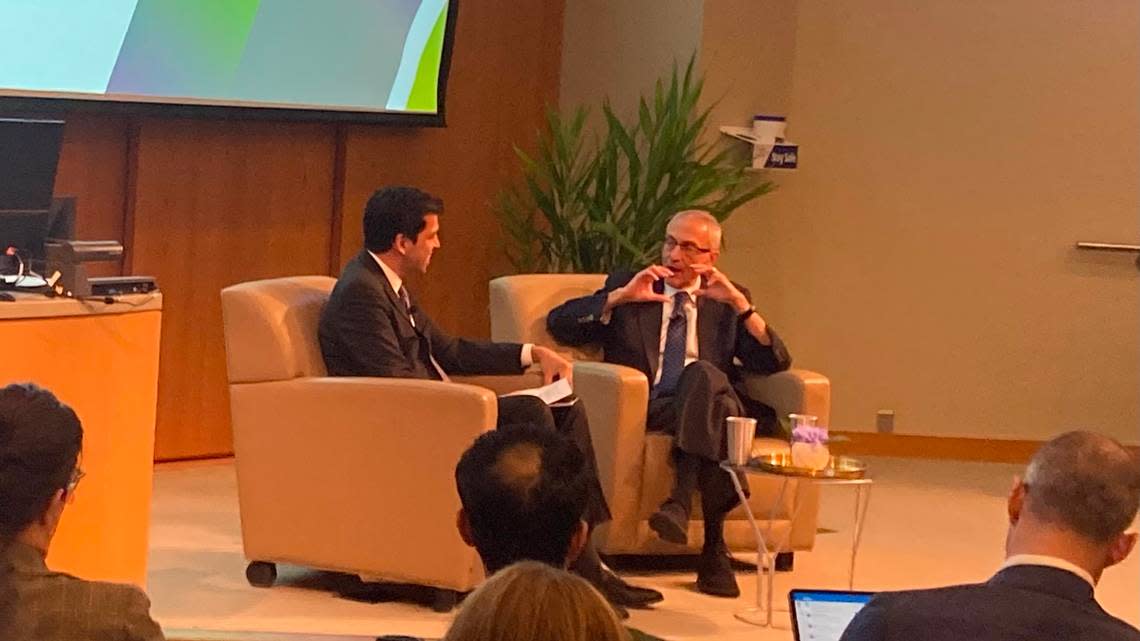Top Biden climate official, Wolfspeed CEO say China’s EV growth is a wake-up call

The Biden administration’s top climate diplomat argued Wednesday that the Inflation Reduction Act’s investments to reduce greenhouse gas emissions will be difficult to reverse, even if a Republican takes the White House in November.
“The investments that are happening are very hard to pull up. The communities that are being affected, the jobs that are being created, the industries that are being created, the innovation that’s happening across the country is going to be very politically difficult to reverse,” John Podesta, a longtime Democratic official who is overseeing Inflation Reduction Act spending, said during a Duke University event.
Duke’s Fuqua School of Business hosted “From Billions to Trillions: The Inflation Reduction Act as a Catalyst for Private Investment.” In addition to Podesta, speakers included Wolfspeed CEO Gregg Lowe. Bill Boulding, the Fuqua school’s dean, said the business community will have to play a role in addressing the climate crisis, scaling up financing for efforts that slash greenhouse gas emissions.
“We need more than generating trillions of dollars. We need to make sure that those trillions of dollars get in the hands of the right people, the right processes, the right technologies that will help us avert this crisis,” Boulding said.
The Inflation Reduction Act, passed in 2022, could play a key role in that. The legislation is expected to result in $369 billion in spending to lower emissions and support the transition away from fossil fuels. The most prominent North Carolina projects that could benefit from the package’s tax credits and incentives are Toyota’s $13.9 billion battery plant outside of Greensboro and VinFast’s planned manufacturing facility in Chatham County.
The Biden administration estimates that $160 billion has been invested in the battery and electric vehicle supply chain nationwide, with $19 billion coming to North Carolina. Much of that is from the two large projects, but Podesta said there are also knock-on impacts like this week’s announcement of a partnership between Fujihatsu Tech America and Toyota Tsusho America that is expected to create 133 jobs making aluminum cell cases and cell covers for electric vehicle batteries.
“You’re getting a pretty good chip of that, so that should be celebrated. And I think more to come,” Podesta said.
Still, investors said they have to be aware of how politics could impact companies they are considering funding.
Charlie Gailliot, the co-head of investment firm KKR’s climate strategy, said he has to account for the November election when considering investments, particularly if Inflation Reduction Act money is part of a company’s funding model.
“Is that money coming before November? And if it’s not we have to take a view on: Can we depend on it?” Gailliot said.
Diana Propper de Callejon, the managing director of investment firm Cranemere, said the turbulence of the past two years has left companies more resilient to potential chaos.
Further, Propper de Callejon said, “Things might go slower because of the change in the opposite direction (but) I don’t think it stops.”
‘A wake-up call’ in EVs, chips
Lowe, the CEO of Durham-based chip manufacturer Wolfspeed, said continued investment in the nation’s electric vehicle supply chain will be key to American automobile manufacturers keeping pace with their competitors in China.
Lowe noted that even though China only has two of the 10 largest car makers, it has five of the world’s largest electric vehicle manufacturers.
“This is a wake-up call to the Western automobile industry,” Lowe said.
To keep pace, American EV manufacturers are turning to silicon carbide, the semiconductor technology Wolfspeed uses in its chips that allows electric vehicle batteries to charge faster and go up to 15% further on a charge.
In the wake of 2022’s CHIPS and Science Act, Durham-based Wolfspeed announced plans to build a $5 billion manufacturing facility in Chatham County, as well as a research and development facility on the N.C. A&T campus in Greensboro. That legislation allows chip manufacturers to claim a tax credit that is equal to 25% of their capital expenses for new factories and equipment.
When it is finished, Lowe said, Wolfspeed expects to be able to claim a significantly larger share of the world’s manufacturing of silicon carbide chips. And cars that use those chips are just beginning to hit the market, Lowe said. He predicted that Tesla will use the technology to make a car that can go 625 miles on a single charge within two years.
“The largest market for automobiles on Earth is converting to electric. It’s a transition that’s not going to stop,” Lowe said.
Helping governments, nonprofits
Podesta also discussed the direct pay provision of the Inflation Reduction Act, which allows nonprofits, local governments, states and schools to receive payments that will help them invest in lower-emission technologies. Those could include buying electric school buses, installing electric vehicle charging infrastructure or investing in solar panels and battery storage.
While eligible entities would typically not pay taxes, the IRA program allows them to file a tax return and effectively claim the tax credit that businesses or other entities that pay taxes would receive. The federal government would then directly pay the nonprofit or government using funds from the 2022 bill, lowering the cost of their project.
“This is pretty new. I think people aren’t thinking about that as much, and the ability to deploy at scale across the country, across the sectors in the economy is just amazing in this law,” Podesta said.
This story was produced with financial support from the Hartfield Foundation and Green South Foundation, in partnership with Journalism Funding Partners, as part of an independent journalism fellowship program. The N&O maintains full editorial control of the work. If you would like to help support local journalism, please consider signing up for a digital subscription, which you can do here.

